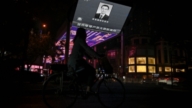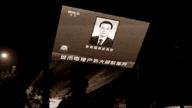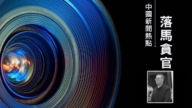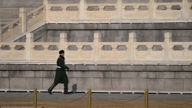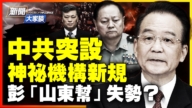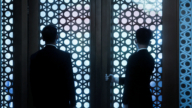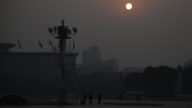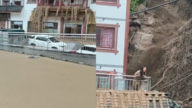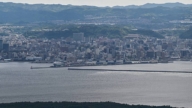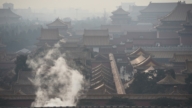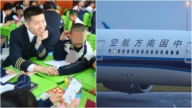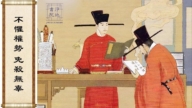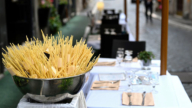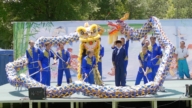【新唐人2012年11月09日讯】一名采访十八大的美国记者,在中宣部组织的参观活动中,被中国官方媒体当作采访对像,并被逼迫走上舞台,穿上京剧戏服,并成为十八大新闻中心报导的重点对像。这位记者在博客上披露当时被迫走上舞台穿上戏服的过程,对自己被逼为中共十八大装门面表达无奈和愤慨。
中共十八大召开前,中宣部安排境外媒体记者参观北京以及周边地区的文化,并在中共喉舌媒体上高调报导,说﹕“境外媒体记者近距离感受中国发展变化”等,并把美国《洛杉矶时报》记者朱丽叶•麦克林(Julie Makinen)身穿京剧戏服的画面作为亮点。麦克林撰文披露了自己是如何成为中共宣传材料的经过。
麦克林说,在十八大召开前的周末,为了防止来自世界各地的几百名外国记者自己挖掘新闻,中宣部安排他们去北京周边和河北省参观。但是她没有料到自己竟然成了中共媒体的采访对像。
麦克林披露说,在各个采访地点,中央电视台、中新社、国际广播电台的中国同行们追着外国记者采访,她很快发现,自己成了他们新闻报导的主角。外国记者躲啊躲,但就是甩不开。
麦克林介绍﹕在河北霸州的李少春大剧院,记者们先被安排观看了所谓《没有共产党就没有新中国》的合唱,然后去看京剧。部分记者被邀请上台表演,她拒绝三次还是被推上台。她说:“我知道,一旦上台,中国记者们将得到他们最需要的镜头和照片。记者们起哄,非要让我上去。我明白了,这会儿即使我冲出门,也会被他们拖回来。我被穿上京剧戏装。中国记者们很兴奋,一片闪光灯,他们得到了想要的宣传材料。”
北京注册会计师杜延林说,中共为自己博宣传,向来不择手段。
北京注册会计师 杜延林:“1.43我觉得这种滑稽的事情在中国是非常司空见惯的。因为他们为了某一个宣传或面子上的需要,可以做出许多违反常理或违反人性的事情。我觉得比较惊讶的是,对于一个外国人,他们也采取这种方式。为了达到他们宣传的目地,可以不择手段,可以不计后果。”
麦克林对中国记者的意图心知肚明,她说,“对于中国同行来说,拍到一个美国记者穿着京剧服装‘下基层’,是给十八大最好的献礼。”
她还披露说,“当央视的话筒伸到我面前时,我下意识摇头晃脑,试图躲开镜头,故意口齿不清,就差抠鼻屎了,为的就是让这个镜头没法用。”当又一波中国记者袭来,问麦克林,十八大她最关注哪些问题,这次她没客气的回答:“西藏,腐败,薄熙来,温家宝家属的财产。”中国记者都快哭了。
杜延林说,官方喉舌这样做的目地是利用外国人为中共统治粉饰太平。
杜延林:“3.00我们知道,好多御用文人或官方经常说我们一些民主人士是挟洋自重,这个词我觉得用在他们身上也挺恰当。因为他们觉得对外宣传的时候,宣传中国,如果仅仅是中国人说,觉得没有说服力。他们必须找一个外国人,包括经常断章取义的引用外国人的说法,对中国的现实进行粉饰太平,涂脂抹粉。”
第二天,麦克林的英国朋友,给她发了刊登着她穿戏服照片的新闻链接,说她成了“十八大的官方白人面孔”。麦克林无奈的说,“我成了宣传工具的一部分,糗死了。”
有网友说,十几年没有看新闻联播了,还在做这样的掩耳盗铃的所谓新闻,很搞笑。一位香港居民说,新闻里一片盛世和谐,万国来朝的景象,可惜经不起推敲啊。
采访编辑/秦雪 后制/肖颜
US Journalist Used In 18th Congress Propaganda
An American journalist covering the 18th National Congress
has been spotlighted in official news about the congress.
The Central Propaganda Dept of the Chinese Communist
Party (CCP) arranged a weekend tour.
The reporter was forced onto the stage,
dressed in a Peking Opera costume.
The reporter regarded it as an “ignominy”
to be used in the CCP’s propaganda.
She disclosed the truth in blogs
in the Los Angeles Times.
Before the 18th Congress, CCP’s Central Propaganda Dept
had arranged a weekend bus tour for foreign journalists.
These journalists were taken to cultural sites in Beijing
and its neighboring areas.
CCP official media reported the itinerary, saying
“Foreign reporters eye diverse issues at congress.”
The spotlight focused on a photo of Julie Makinen, a reporter
for the LA Times, dressed in Peking Opera finery.
In her article, Makinen revealed how she was included
“in a propaganda piece” for the CCP authorities.
Julie Makinen wrote, ahead of the Party Congress’ opening,
“Lest the 1,000-plus reporters expected in Beijing
start looking around for juicy stories on their own.”
“To keep journalists busy”, the official media center,
took them on a trip to Beijing’s outskirts and Hebei province.
Makinen did not expect that she was later targeted
by CCP official media reporters.
Julie Makinen was “approached by reps from the official
New China News Agency, Sinovision New York and China Radio International.”
“I wasn’t alone. A Japanese writer and an American
radio journalist were besieged too.”
Makinen wrote, they “stumbled” upon some senior citizens
rehearsing the song, “Without CCP, There’s No New China.”
Foreign reporters were then taken to a Peking opera theater.
“A few reporters were invited on stage to try out some musical instruments.”
While Makinen, after refusing the emcee three times,
reluctantly took to the stage.
“But the rest of the press herd knew if I were to go on stage,
they’d get their shot of the day.
A few shouts of encouragement went up.
At this point, even if I had bolted for the exit,
I’m pretty sure I would have been tackled.”
“Peking opera costumes were presented.
Wouldn’t we like to try them on?”
“Cameras clicked. Videotape rolled…
the Chinese press went home delighted.”
Du Yanlin, a CPA living in Beijing, believes that the CCP
makes its propaganda by using all unscrupulous means.
Du Yanlin: “Such absurdity is too common in China.
It does numerous anti-humanity things
just for its propaganda, or to save face.
What surprised me is that they even did the same thing
with foreign reporters.
The authorities propaganda is really by hook or crook
and simply discretionary."
Well aware of Chinese reporters intentions, Makinen wrote,
“What’s more irresistible to China’s propaganda machine than an American reporter in a Peking opera costume.”
Julie Makinen recalled facing Chinese reporter’s microphone.
“I scratched my head, mumbled and looked off camera,
doing everything short of picking my nose in an attempt to make the footage completely unusable.”
Another reporter queried, “What are the critical issues of
the 18th Party Congress?”
Makinen answered, “Tibet, corruption, the purge of politician
Bo Xilai, and questions about Premier Wen Jiabao’s $2.7-billion family fortune,” “the reporter frowned.”
Du Yanlin remarks that the official media obviously used
these foreigners to whitewash CCP’s ruling.
Du Yanlin: “Many CCP-hired scholars or the official media
often assert that a lot of democrats play themselves up by relying on foreigners.
I think this description can be nicely put on themselves, too.
As the authorities know that
only Chinese remarks aren’t that convincing.
So they deliberately used foreigners,
and often take their remarks out of context.
All what they’ve done just serves as window-dressing.”
The next day, Makinen’s British friend sent her the news link,
“You are officially the (white) face of the Party Congress!”
Makinen wrote, “Being included in a propaganda piece
is a momentary ignominy.”
One netizen commented that he hasn’t watched CCTV news
for over a decade.
And yet, it seems that the CCP regime
still introduces such self-deceiving news.
A Hong Kong resident commented that China’s news are
always filled with heydays and harmonies, but are unable to withstand close scrutiny.



